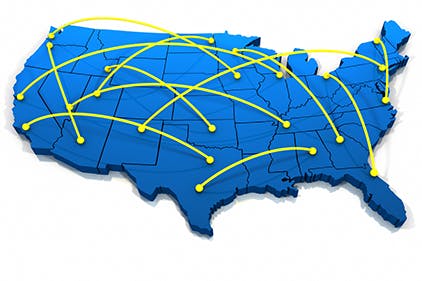Consider This with Multi-state Compliance
Understanding multi-state compliance for payroll taxes can be complicated.

Running payroll in a single state is complicated enough. Adding in another – or two, or three - and trying to maintain compliance takes 'complicated' to a new level. Playing by tax rules set at the federal, state, and local level is integral to accurately performing payroll. Here are some helpful things to consider when processing multiple states.
Nexus/Reciprocity and State Withholding
Before defining nexus and reciprocity it’s important to know withholding laws. Every state – except for Alaska, Florida, Nevada, Texas, South Dakota, Washington, Wyoming, New Hampshire, and Tennessee – impose a specific withholding income tax on all workers.
Every business in America has nexus – which means a physical presence. The withholding for this state must be properly taken out of each and every employee paycheck. But what about some large companies with stores and offices in multiple states? Or ones with remote workers? This is where reciprocity comes into play, and it is simply an agreement between certain states allowing for only one state’s taxes to be imposed, and therefore only one state W-2 to be completed. So, if an employee lives in New Jersey but works in Pennsylvania, he or she can request exemption from Pennsylvania taxes, because those two states have an agreement in place. This is generally more common in the Midwest and East.
Common Ownership
The Affordable Health Care Act (ACHA) defines what a small and large employer are based on the amount of employees in a said business. For example, if your company has fewer than 50 employees, you’re considered 'small.'
Another vital stipulation of the AHCA that relates directly to taxes and staying compliant is 'common ownership.' Across the country, there are countless franchised companies. The business that owns and controls each individual franchisee must count the number of employees across ALL franchised locations to determine their ACHA eligibility status. It is not on an individual-franchisee level. Then, if those companies exceed 50 employees, they must provide health care coverage
accordingly.
Minimum Wage Laws
Minimum wage is all the rage currently. Several states, cities, and counties have created and signed laws upping theirs from the federal rate. For businesses operating in more than one location, payroll and finance departments must pay special attention to the rate and when it takes effect. Countless areas in America, like New York and California, have tiered programs in place in order to reach a $15 per hour minimum wage by a certain date.
Family and Medical Leave Act (FMLA) and State Leave Laws
Employers can’t avoid the FMLA, which protects employees’ jobs if they should need to take leave for qualified reasons. Each state has its own leave laws, as well, and while the federal government doesn’t mandate employers pay employees during leaves, some states do. For example, California is one that provides paid leaves of absence. If a company is based in California, and one of its workers in a separate state needs extended time off, he or she must be given the correct type of leave based on California.
Unemployment Tax
Like the FMLA, the federal government and each state’s impose an unemployment tax on employers. Overall, the system is largely run on the state level. In multi-state scenarios, the unemployment tax should be paid based on where the employee works, not live. This can actually be a very general rule to abide by, but can differ based on reciprocity agreements.
Still have concerns? Learn more about our products that have multi-state processing and nexus and reciprocity considerations built into them.
